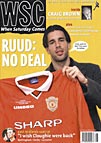 Martin O’Neill has worked wonders at Leicester but, as John Williams explains, his mentor’s title-winning achievements are out of reach
Martin O’Neill has worked wonders at Leicester but, as John Williams explains, his mentor’s title-winning achievements are out of reach
Earlier this season Leicester City, playing at home in the Worthington Cup and stinking out even Filbert Street’s Shanks and McEwan Stand (sponsor’s motto: “For all your waste needs”), found themselves two goals down to a Fulham side late in the match. The visitors had run the game and at most clubs this might already have been given up and put down as just a bad night. Not here. A whirling Martin O’Neill signalled a final throw, a new City partnership up front.
A shambling converted centre back joins an ageing, ill-disciplined club talisman and a giant, shaven-headed defender. Speed and elegance are not features here. Nevertheless, Ian Marshall, Steve Walsh and Matt Elliott fashion two late goals. The early leavers, following events on the radio, begin to refill the ground. Even they know that the last eight times City games have gone to extra time, they have come out on top in seven. Leicester go on to win not only the tie but also the cup – for the second time in four years.
After City had disposed in similar ways of Arsenal, Villa and Leeds in cup competitions, newspapers began to turn on O’Neill’s team, claiming it played “boring, parasitic football”, “lumping it” like a new Wimbledon but without the latter’s excuse of lack of resources. “For the good of the game,” wrote the Observer’s pious Ian Ridley, “Leicester should make it to neither of the Wembley finals this year.” Arsène Wenger, John Gregory and football guru Ken Bates all seemed to agree.
Resources? City, mainly because of marketing genius, turn over about £25 million a year and play in a 21,000 capacity stadium where two sides are still little more than glorified sheds. Plans for a new ground a couple of hundred yards over the nearby canal are now in shreds following the recent struggle for control of the club. Leicester’s record transfer fee is still around a third of what Wimbledon wasted on John Hartson. O’Neill and his sidekick, the shuffling ex-Forest ace John Robertson, prefer to recruit from the lower orders, trusting, like Sunderland’s Peter Reid, to the selfless loyalty of their men as a result.
There is plenty of his old boss, Brian Clough, of course, in O’Neill’s gently teasing assessment of the hyper-committed Filbert Street favourite, Robbie Savage, that the only thing the man brought from Crewe lacks is football ability. Clough, more unfairly, once implied the same about O’Neill. Martin is, indeed, his football father’s son, as his recent tetchy TV pundit appearances have shown.
Whether O’Neill can drag Leicester to anything like the heights that Clough took Forest and Derby must be doubtful. The days when one of the east midlands clubs can make a serious mark on the championship or in Europe seem long gone. City were 21st in the Independent’s “team of the century” listings, behind both east midlands rivals, rather confirming the “yo-yo” claims about the club’s proper place.
Back in the 1970s, City manager Jimmy Bloomfield complained Leicester was not really a “football town” challenged as it was then – and now – by the claims of cricket and especially rugby union: the Leicester Tigers ground is a couple of hundred yards from Filbert Street and regularly attracts 15,000 fans who might otherwise follow City. The Tigers still annoyingly sport the “Leicester Football Club” tag and are the richest and most professionally run union club in the country. As the recent Leicester local authority booster campaign points out, Leicester is a city of sport, not football.
Add to this the fact that by 2004 more than half of Leicester’s population will be of Asian origin and this gives some clues to City’s campaigns aimed at recruiting more Asian fans (where leanings towards Manchester United and Liverpool still reign) and their frustrations about the limits of local markets. Cleverly marketed reserve team football is now beginning to draw in a substantial Asian football audience for the first time at Leicester, or probably anywhere in the country.
Leicester fans are stoical about most of this. Patience has been stretched by the desertion of previous managers Brian Little and Mark McGhee, both of whom have satisfyingly plummeted without trace since. Suspicions remain, however, that O’Neill may be the next to go. Recent well-publicised tensions between the football and the highly developed “business” sides of the club suggest O’Neill’s quirky authoritarianism sits ill with the corporate practices of a footballing plc. The new board claim City are no longer a selling club, mainly because of its marketing successes, though the departure of Emile Heskey suggests otherwise.
Frustrating, too, is the unrequited nature of local fan rivalries. Attention in Leicester has turned instead to stoking up local solidarities in the face of perceived injustices, such as the two questionable refereeing decisions in FA Cup ties at Chelsea. These, added to the London media hype about “boring” Leicester, have nicely fed the bloody minded determination of O’Neill, his players and the fans.
How long Leicester can keep him is another matter, though for all the talk about big clubs showing an interest in Leicester’s man, O’Neill still shows more signs of enjoying tweaking the tails of monsters than of joining one himself.
From WSC 160 June 2000. What was happening this month